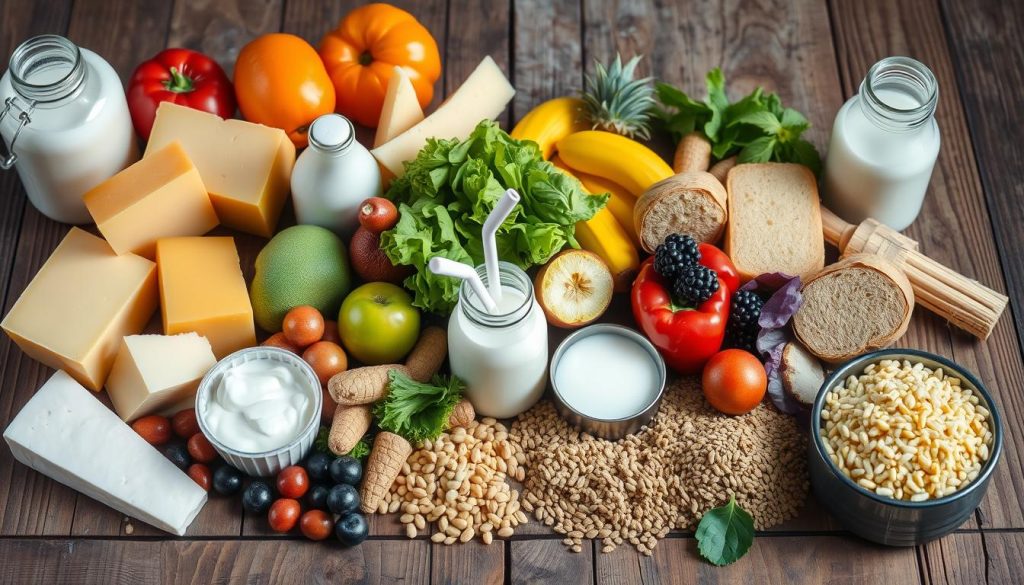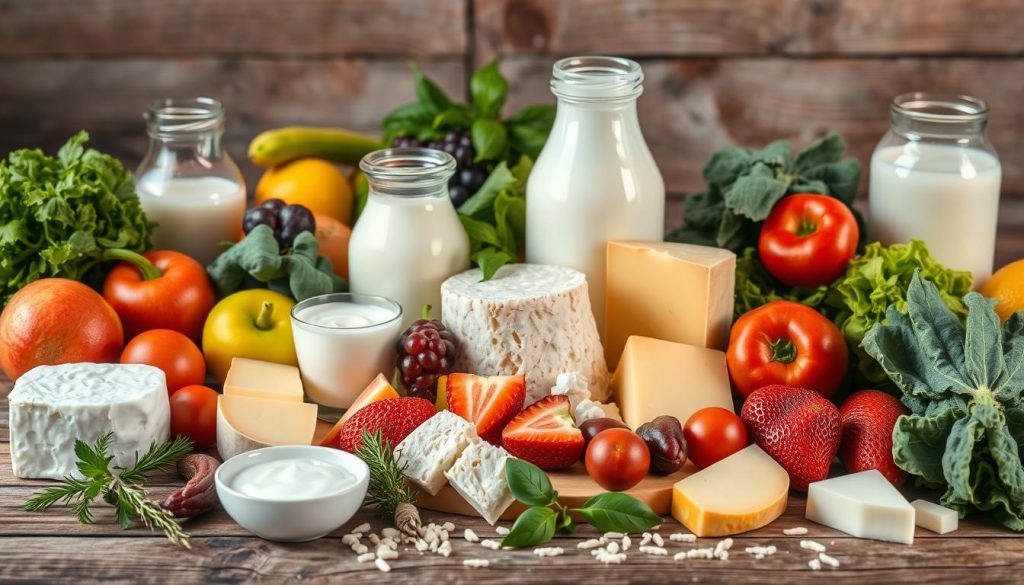As you pour another glass of milk or add extra cheese to your sandwich, you might wonder if it’s causing stomach trouble. The question of whether do milk products cause constipation is important. It’s not just about personal feelings but also something nutritionists and doctors are looking into.
Dairy is a big part of our diet, so understanding its impact on our health is key. We’ll look into how dairy and constipation are connected. This includes looking at scientific studies, our eating habits, and our health stories. We want to give you a clear picture of how milk might affect your digestion.
Let’s explore the facts together. We’ll talk about the downsides of dairy on your gut and how to enjoy it without discomfort. Stay with us as we dive into a topic that’s as sensitive as your stomach.
Understanding Constipation: Basics and Causes
Constipation is a common health issue that can really affect your life. It’s important to know the constipation basics to understand its causes and manage symptoms. Knowing how diet, like dietary causes of constipation, affects your gut health is key.
What Is Constipation? An Overview
The National Institute of Diabetes and Digestive and Kidney Diseases (NIDDK) says constipation is when you have infrequent or hard bowel movements. It can cause a lot of discomfort and even lead to serious problems like hemorrhoids or fecal impaction if not treated.
Common Dietary Causes of Constipation
Your diet is very important for your digestive health. Some foods can make constipation worse, while others can help. The Mayo Clinic says not getting enough fiber is a big reason for constipation. Foods high in fat and processed foods also move slowly through your system, adding to the problem.
Milk and stomach problems are often linked, too. Harvard Health Publishing notes that dairy can make stool harder to pass for some people. So, if you have a sensitive stomach, watch how much dairy you eat.

- Increasing fiber intake: Naturally found in fruits, vegetables, and whole grains, fiber helps maintain bowel health.
- Stay hydrated: Drinking enough water softens the stool, making it easier to pass.
- Regular exercise: Physical activity can help increase the muscle activity in your intestines.
By learning about the causes and constipation basics, you can make dietary changes to improve your digestion. Paying attention to how milk and stomach problems affect you can also help if you have ongoing digestive issues.
The Connection Between Dairy Products and Digestive Issues
Looking into the link between dairy products and digestive issues, we find strong evidence. Studies show how dairy affects our gut health. They focus on the connection between lactose and bowel movements, revealing its impact on digestion.

The American Journal of Clinical Nutrition found that dairy can worsen some digestive problems. This is because of lactose, a sugar many can’t digest well. This can cause anything from mild discomfort to serious digestive issues.
The Cleveland Clinic also shared insights. They said that milk products can cause bloating, gas, and constipation in some people. These problems come from not being able to digest lactose properly, which messes with bowel movements.
- Many people have some level of lactose intolerance.
- Symptoms include bloating, abdominal pain, and changes in bowel habits.
- Changing how much dairy you eat can help a lot.
A study looked at both kids and adults and found a link between dairy and digestive health issues. It showed a range of reactions, from mild intolerance to severe allergies. All these reactions affect how dairy impacts the stomach and intestines.
Learning about different dairy products and their digestion effects can help. Knowing this information lets people choose foods that are better for their bodies.
Do Milk Products Cause Constipation? The Evidence
Recent studies have looked into if dairy might cause constipation. This part explores the scientific evidence of dairy and constipation. We’ll look at both big studies and small trials.
Scientific Studies on Dairy and Bowel Movements
Many studies have checked how dairy affects bowel movements. A big review found that some people, like those sensitive to lactose, might have slower digestion. Full-fat dairy can make this worse, causing constipation in some.
Analyzing the Data: How Dairy May Lead to Constipation
To understand dairy and constipation, we need to analyze dairy-related constipation. We focus on milk’s main parts: casein and lactose. Casein takes a long time to digest, slowing down bowel movements. Lactose can cause gas and bloating in those who can’t digest it, leading to constipation.
Lactose Intolerance and its Relation to Constipation
Exploring the connection between lactose intolerance and constipation sheds light on how food choices affect our digestion. The American Academy of Allergy, Asthma & Immunology explains that lactose intolerance happens when our body can’t break down lactose, a milk sugar. This issue can lead to bloating, gas, and stomach pain. It can also cause constipation, a less common symptom.
Studies on dairy sensitivity and constipation have mixed results. Yet, some people with lactose intolerance find they have less frequent bowel movements. This is because undigested lactose in the colon can affect water absorption and bowel regularity.
- Bloating and gas due to lactose fermentation
- Increased water reabsorption leading to harder stools
- Altered intestinal motility
The way lactose interacts with colon bacteria can change gut motility and stool consistency. This sometimes leads to constipation.
| Symptom | Often Associated With Dairy Sensitivity | Often Associated With Other Conditions |
|---|---|---|
| Bloating | Yes | Yes |
| Gas | Yes | Sometimes |
| Constipation | Sometimes | No |
| Abdominal Pain | Yes | Yes |
Milk Allergy vs Lactose Intolerance: Understanding the Differences
It’s key to know the difference between milk allergy and lactose intolerance. Both affect digestion but in different ways.
Defining Milk Allergy and Lactose Intolerance
A milk allergy is when your immune system reacts to cow’s milk proteins. On the other hand, lactose intolerance is when your body can’t break down lactose, a milk sugar. Knowing this helps in treating each condition right.
The Impact of Milk Allergy and Lactose Intolerance on Digestion
Both can affect your digestion but in different ways. Knowing how they work can help ease symptoms like milk allergy and constipation.
| Condition | Symptoms | Management |
|---|---|---|
| Milk Allergy | Wheezing, vomiting, hives, digestive distress | Avoidance of all dairy products, use of lactose-free alternatives |
| Lactose Intolerance | Bloating, diarrhea, gas, and in some cases, constipation | Lactose-reduced diets, lactase enzyme supplements |
Milk allergy can cause severe reactions like anaphylaxis. But lactose intolerance is usually milder but can make life uncomfortable. Both need diet changes to manage symptoms well. So, it’s vital to understand the differences between milk allergy and lactose intolerance.
Exploring Dairy Sensitivity and Constipation
Dairy sensitivity is a big topic in nutrition, focusing on its effects on digestion. It shows how dairy can change how our guts work, including bowel movements. This has led to some important discoveries.
What Does Dairy Sensitivity Entail?
A dairy sensitivity means having bad reactions to dairy products. Symptoms can be bloating, gas, and changes in bowel movements. It’s different from lactose intolerance and milk allergy because it can be caused by many things in dairy, not just lactose.
Case Studies: Dairy Sensitivity and Slower Bowel Movements
Recent studies on dairy sensitivity have found links to bowel movement changes. These studies help doctors diagnose and treat digestive problems.
| Study | Number of Participants | Bowel Movement Frequency Before | Bowel Movement Frequency After |
|---|---|---|---|
| Study A | 50 | Daily | 3-4 times per week |
| Study B | 30 | Twice daily | Once daily |
| Study C | 40 | Daily | 5 times per week |
This table shows how bowel movement frequency drops after eating dairy for those with dairy sensitivity. The findings from these case studies on dairy sensitivity are key for more research and dietary advice.
Could Your Love for Cheese Be Slowing You Down?
If you love cheese, you might wonder if it affects your digestion. The link between cheese and constipation is interesting. It shows how diet can impact our health.
The American Journal of Clinical Nutrition found that high-fat cheese can slow down digestion. This is important for those concerned about high-fat dairy products and digestive health.
Also, cheese’s nutritional content affects our gut health. For those sensitive to dairy, knowing which cheese to eat and how much is key to good digestion.
| Cheese Type | Fat Content | Effect on Digestion |
|---|---|---|
| Cheddar | High | May increase constipation risk |
| Camembert | Medium | Moderate impact on digestion |
| Feta | Low | Less likely to affect bowel movement |
The table shows that cheese’s fat content affects digestion. Your choice of cheese can influence your bowel regularity.
It’s important to know how your body reacts to different cheeses. Enjoying cheese can turn into cheese and constipation issues. This is true for those who love high-fat cheeses and need to watch their intake for better digestion.
Lactose and Bowel Movements: Decoding the Relationship
Recent studies have shown how dairy affects our digestive health. They found that lactose, a sugar in milk, can impact gut health. This might help or hinder constipation, depending on how our bodies react.
The Role of Lactose in Gut Health
Lactose is a sugar in milk that can affect our gut health in different ways. For those who can’t digest lactose, it can cause stomach problems. This might change the balance of good bacteria in the gut.
Research shows that undigested lactose can pull water into the gut. This can lead to loose stools for some. But for others, it might cause constipation, depending on how much water they drink and how fast their gut moves.
Does Lactose Directly Affect Constipation?
The link between lactose and constipation is a topic of ongoing research. Some studies say lactose can slow down bowel movements, leading to constipation in those who can’t digest it. But, how people react to lactose can vary a lot.
This depends on how much lactase enzyme they have in their gut and what else they eat. So, not everyone will experience constipation from lactose.
Are Children More Susceptible to Dairy-Induced Constipation?
Recent studies have shown that dairy can affect kids’ digestive systems. This can lead to constipation, which is a big worry for parents and doctors. Constipation means kids don’t go to the bathroom often and have trouble when they do.
Kids are more likely to get constipated from dairy because their digestive systems are not fully grown. Milk and cheese can upset their stomachs, causing constipation.
- Evidence from Pediatric Studies: Studies show that eating a lot of dairy can make kids constipated. This can be from mild to very serious problems that need a doctor.
- Recommendations from Pediatricians: Doctors often tell parents to watch how much dairy their kids eat if they’re constipated. They might suggest trying dairy-free options to help.
Changing what kids eat is usually the first step to help them. It shows how important what we eat is in dealing with constipation caused by dairy.
| Age Group | Dairy Intake Frequency | Constipation Incidence |
|---|---|---|
| Under 3 years | Daily | High |
| 4-7 years | Thrice a week | Moderate |
| 8-12 years | Occasional | Low |
This table shows a clear connection between how often kids eat dairy and getting constipated. Changing how much dairy kids eat can really help many parents manage constipation.
Gut Health and Dairy Products: A Complex Interaction
The relationship between gut health and dairy products is complex. Dairy has both good and bad effects on digestion. It’s important to understand how dairy affects our gut.
Probiotics in Dairy: Are There Benefits?
Dairy, like yogurt and kefir, is full of probiotics. These good bacteria help with digestion and gut health. They break down food and help absorb nutrients.
But, probiotics in dairy might not be good for everyone. Lactose intolerance and other digestive issues are concerns. It’s key to know how your body reacts to dairy.
How Dairy Can Both Harm and Help Gut Health
Dairy is rich in calcium and vitamins, which are good for health. But, its lactose can cause problems for some. This can lead to bloating, gas, and diarrhea.
It’s important to know how your body reacts to dairy. This way, you can enjoy its benefits while avoiding the bad effects.
| Dairy Product | Probiotic Content | Potential Digestive Issues |
|---|---|---|
| Yogurt | High | Low (for lactose-tolerant individuals) |
| Kefir | Very High | Low (for lactose-tolerant individuals) |
| Milk | None | High (for lactose-intolerant individuals) |
| Cheese | Low to Moderate | Medium (varies by type and processing) |
Dairy Alternatives: Are They Better for Bowel Health?
More people are choosing dairy alternatives to help their bowel health. These options avoid common allergens in cow’s milk. They also have different nutrients that might be gentler on the stomach.
Studies show that plant-based milks like almond, soy, and oat milk have fewer irritants. They are lactose-free and often have added vitamins and minerals. Research suggests they might help with digestion and regular bowel movements.
Dairy alternatives have different nutrients, affecting bowel health in various ways. Here’s a look at their fiber content, which is key for digestion.
| Dairy Alternative | Fiber Content (per cup) | Notable Nutrients |
|---|---|---|
| Almond Milk | 1g | Calcium, Vitamin E |
| Soy Milk | 2g | Protein, Isoflavones |
| Oat Milk | 2g | Beta-Glucans, Iron |
| Coconut Milk | 0g | MCTs, B Vitamins |
Each dairy alternative has its own benefits for digestion and gut health. Soy and oat milk’s fiber helps with digestion and feeling full. But, it’s important to pick the right one for your health needs.
For better bowel health, talk to a healthcare provider or nutrition expert. They can help tailor your diet to your needs. This ensures you get the right nutrients for your digestive system.
Cheese and Constipation: Analyzing the Culprits
When we talk about digestive health, cheese gets a lot of attention. But not all cheeses are the same. Some cheeses might affect your digestion more than others, thanks to their fat content. Let’s look at which cheeses could make bowel movements slower.
High-Risk Cheeses for Constipation
Cheeses with a lot of fat and little fiber are often linked to constipation. Their dense and rich nature slows down digestion. Here are some cheeses that might cause problems:
- Cheddar
- Parmesan
- Gouda
These cheeses are loved for their taste but can be tough on your stomach.
The Role of Fat Content in Cheese-Related Digestive Issues
The fat in cheese changes its taste and texture. It also affects how it’s digested. High-fat cheeses need more bile acids and digestive enzymes. This can slow down digestion and lead to constipation.
| Cheese Type | Fat Content | Risk Level |
|---|---|---|
| Cheddar | 33g per 100g | High |
| Parmesan | 29g per 100g | High |
| Gouda | 27g per 100g | Medium |
| Cottage Cheese | 4g per 100g | Low |
Milk and Stomach Problems: Tips for Dairy Lovers
Many people love dairy but face stomach discomfort. But, you don’t have to stop enjoying your favorite dairy foods. Here are some tips to help you enjoy dairy without stomach issues.
- Understand your threshold: Find out how much dairy you can handle without feeling bad. Everyone is different.
- Choose lactose-free options: Look for lactose-free milk and dairy products. They’re a great alternative.
- Integrate digestive aids: Try lactase enzyme supplements before eating dairy. They can help.
- Opt for hard cheeses: Cheeses like Parmesan and aged Cheddar have less lactose. They might be easier to digest.
- Incorporate probiotics: Yogurts and kefir with live cultures can improve your gut health. This can help with symptoms.
Making small changes in your diet can help you enjoy milk and dairy without stomach problems. Try these tips to make dairy a part of your diet without discomfort.
How to Enjoy Dairy Without the Discomfort
If you love dairy but worry about its effects on your stomach, there are ways to enjoy it without discomfort. Start by controlling how much you eat. Eating small amounts can help your stomach feel better.
Choosing low-lactose dairy products is also a good idea. They let you enjoy creamy foods without the usual stomach problems. Many stores now sell lactose-free or lactose-reduced products that taste great but don’t upset your stomach.
To manage dairy well, mix it up and keep things balanced. Adding fermented dairy like yogurt and kefir can help your digestion. This way, you can enjoy dairy’s good stuff like calcium and vitamin D without stomach trouble.
Also, make sure your diet is full of fiber from fruits, veggies, and whole grains. Drinking plenty of water is important too.
In short, with the right approach, dairy can be a pleasure, not a problem. By picking low-lactose options, eating in moderation, and keeping your diet balanced, you can enjoy dairy’s taste and health benefits. With careful eating, dairy can be a happy part of your daily meals and snacks.
FAQ
Q: Do milk products cause constipation?
A: Milk products might cause constipation in some people. This is true for those who are sensitive to dairy, lactose intolerant, or eat a lot of dairy. But, not everyone will experience this issue.
Q: What is constipation and what typically causes it?
A: Constipation is when you don’t go to the bathroom often or have trouble passing stool. It can be caused by not eating enough fiber, not drinking enough water, or eating certain foods. High-fat dairy products might slow down digestion and cause constipation.
Q: How do dairy products affect digestion?
A: Dairy has lactose, which some people can’t digest well. This can lead to symptoms like bloating and discomfort. The fat in some dairy products can also slow down digestion, causing constipation.
Q: Is there any scientific evidence that dairy can lead to constipation?
A: Yes, studies show dairy might cause constipation in some groups, like kids and those with dairy sensitivities. But, the evidence isn’t the same for everyone.
Q: Can lactose intolerance cause constipation?
A: Lactose intolerance usually causes diarrhea and bloating. But, it can also cause constipation in some people. The body’s trouble breaking down lactose can affect bowel habits.
Q: What’s the difference between milk allergy and lactose intolerance?
A: A milk allergy is an immune reaction to milk proteins, causing symptoms like hives. Lactose intolerance is when the body can’t break down lactose, leading to digestive issues.
Q: What does dairy sensitivity entail and can it cause slower bowel movements?
A: Dairy sensitivity means having a bad reaction to dairy, leading to symptoms like bloating and constipation. It can make bowel movements slower.
Q: Can eating cheese contribute to constipation?
A: Yes, some cheeses, like high-fat ones, can cause constipation. Their fat content slows digestion, making stools firmer and bowel movements less frequent.
Q: Does lactose directly affect bowel movements?
A: Lactose can affect bowel movements, mainly in those with lactose intolerance. It can cause diarrhea in some, but constipation in others due to changes in gut motility.
Q: Are children more susceptible to dairy-induced constipation?
A: Yes, kids are more likely to get constipation from dairy. Their digestive systems are developing, and studies show a link between dairy and constipation in children.
Q: How can dairy influence gut health both positively and negatively?
A: Dairy has nutrients like probiotics in yogurts that can help digestion. But, for those with sensitivities or intolerance, dairy can harm gut health, leading to constipation or other issues.
Q: Are dairy alternatives better for digestion and bowel health?
A: Dairy alternatives, like plant-based milks, might be better for those with lactose intolerance or sensitivities. They can offer digestive benefits without the negative effects of dairy.
Q: Which cheeses should be avoided to prevent constipation?
A: Avoid or limit cheeses high in fat and low in fiber, like cheddar or cream cheese. They can slow down bowel movements.
Q: How can individuals manage milk-induced stomach problems?
A: To manage stomach problems from milk, try lactose-free options, eat smaller portions, and include fiber in your diet. Stay hydrated and consider probiotic-rich dairy products to aid digestion.
Q: What are some ways to enjoy dairy without discomfort?
A: Enjoy dairy without discomfort by choosing lactose-free milk, aged cheeses, or yogurt with active cultures. Look for dairy products with digestive enzymes. Monitoring your intake can also help.


















